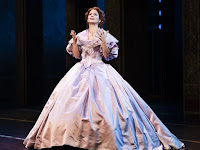Yo ho ho ... here be the tales of some of the most infamous women pirates known. Staged on the 100-year-old Lehigh Valley Barge No. 79 in Red Hook, also home to The Waterfront Museum,
Blood Red Roses: The Female Pirate Project uses shadow puppetry and sea shanties to tell the stories of six fierce females.
The location adds to the experience, and requires attendees to walk along a pier with a beautiful view of the Statue of Liberty and the New York City skyline, up a gangway wrapped with sparkling green lights. Throughout the show, the barge gently rocks and rolls as the story unfolds. The five-member ensemble enthusiastically sings a dozen traditional, but slightly modified songs, clearly enjoying themselves and the material.
The shadow puppetry is fun to look at, but often seems unsophisticated -- there's beating hearts to signify love and simple boats with sails ... a lot. Some of the stories engage more than others. Grace O'Malley, an Irish lass, who reportedly met with the Queen Elizabeth I over a cruel governor's treatment of her family, and successfully navigated the seas as a merchant/pillager in the 1500s, is a fascinating enough character that several shows have been written about her, including the musical,
The Pirate Queen, by
Les Mis collaborators Alain Boublil and Claude-Michel Schonberg (with Richard Maltby, Jr. and John Dempsey). Also, interesting was the portion on two cross-dressing pirates that spent many years disguised as men, Anne "Bonne" Bonney and Mary "Mark" Read, who remarkably ended up on the same ship.
The multiple story lines are easy to follow since a bell is rung and the song, "Rolling Sea," is sung each time there's a switch. Whether that decision was from Director Gretchen Van Lente or Music Director Amy Carrigan, it works beautifully since the catchy "Oh my rolling sailor, when she's on a rolling sea" lyrics are quite hummable and some audience members were singing along by the end of the show. Plus, there is an excellent version of "What Do We Do With a Drunken Sailor" - that slightly deviates from the one you may have learned in elementary school chorus.
Blood Red Roses is divided into five parts: Revenge, Honor, Survival and Escape, Power and Adventure, defining the main theme of each women's life--the construct doesn't work as it insinuates that these female pirates were one-dimensional, something their stories show as untrue. Their tales fascinate, and the further reading list in the program will certainly be used by many audience members. The show, except for some indecent language (they are pirates, after all), is appropriate for older children. My 11-year-old sang the "Rolling Sea" song all the way home.
Runs through May 31. Shows are Friday, Saturday and Sunday and begin at sundown (around 8:15 p.m.) For tickets: http://bloodredroses.brownpapertickets.com/
(Press tickets)








